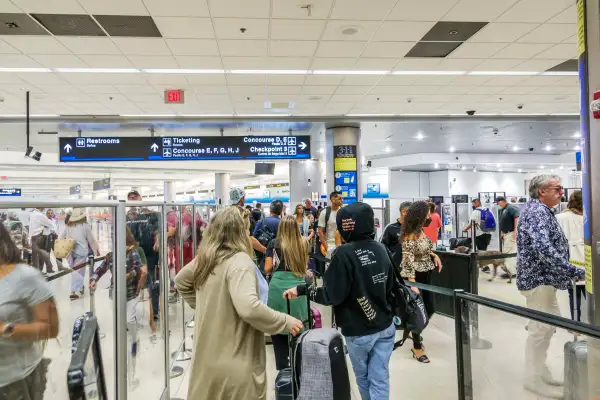Attention, Travelers: The Cost of Global Entry Is Increasing Next Week

Want the coveted "trusted traveler" status that allows you to zip through airport and border security? Soon, it'll cost you much more to apply.
U.S. Customs and Border Protection, or CBP, is hiking application fees for several of its trusted traveler programs for the first time in 15 years. Beginning Tuesday, Oct. 1, applications for Global Entry, NEXUS and SENTRI will all require an upfront $120 fee.
“The original fees for each of the three programs are no longer sufficient to recover CBP's costs to administer the programs,” wrote Alejandro N. Mayorkas, the secretary of homeland security, in the final rule published in April.
These three particular expedited-clearance programs are for qualifying U.S. citizens, residents and nationals who are re-entering the country by land, sea and/or air — as opposed to TSA PreCheck, which is solely for air travel originating from the U.S.
The new rule has been in the works since 2020. While it doesn't directly affect the price of TSA PreCheck, the three CBP programs slated for the price hike include complimentary TSA PreCheck benefits for qualifying travelers, which may result in an indirect price hike for folks looking to bundle benefits.
On the other hand, the new price structure could reduce costs for some families, as it waives application fees for minors whose parents have already applied.
Why 'trusted traveler' fees are going up
Before the rule change, the trusted traveler initiatives charged different amounts, and the SENTRI (Secure Electronic Network for Travelers Rapid Inspection) program actually had several fees throughout the lengthy approval process.
According to CBP, when the programs first started, each one was run individually — but as they expanded, the application process was largely streamlined. Now, the agency says it wants to “harmonize” the fee structure, too.
What that means for globetrotters is that the application fees are rising notably for Global Entry, NEXUS and SENTRI. Here’s a closer look at the programs and their fees.
- Global Entry: Price is rising from $100 to $120. Includes TSA PreCheck. Allows expedited security clearance for land, sea and air entry into the U.S. Application processing time may take up to six months. Membership lasts five years.
- NEXUS: Formerly $50. May include TSA PreCheck for qualifying applicants. A Canadian-U.S. program, it allows expedited clearance via land, sea and air (including pedestrian entry) to or from Canada. Application processing time may take up to 14 months. Membership lasts five years.
- SENTRI: Had a complex fee structure that totaled $122.25. An application fee, an FBI fingerprinting fee and a service fee were charged separately to reach the grand total. Starting in October, $120 will be due upfront. Benefits largely mirror NEXUS but exclude sea travel and include Mexico. Application processing time may take up to 12 months. Membership lasts five years.
Given the new fee structure, it will cost $20 more to apply to Global Entry. For Nexus, fees will increase by $70. To simply apply, the fee for the SENTRI program will increase $95 — but the cost of the entire approval process will decrease by $2.25.
Of course, applying does not guarantee approval. Applicants must pass a rigorous background check — being screened against terrorist and criminal databases — and then clear an in-person interview. (For renewing members, the CBP recently started allowing remote video interviews.) The good news is that several travel rewards credit cards told Money that they are increasing their reimbursement benefits to cover the cost of the new fees.
However, don't expect faster service. The higher fees are not intended to result in faster application processing times, CBP said.
More from Money:
The Best Airline Credit Cards of 2024
You Can Now Renew Your Passport Online (but It Still Costs $130)






